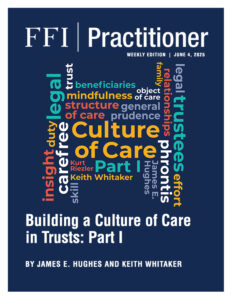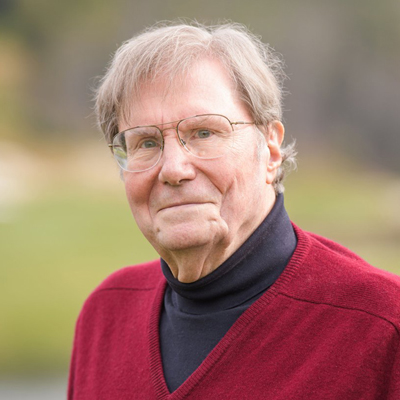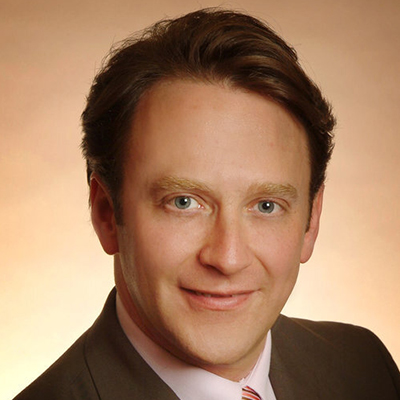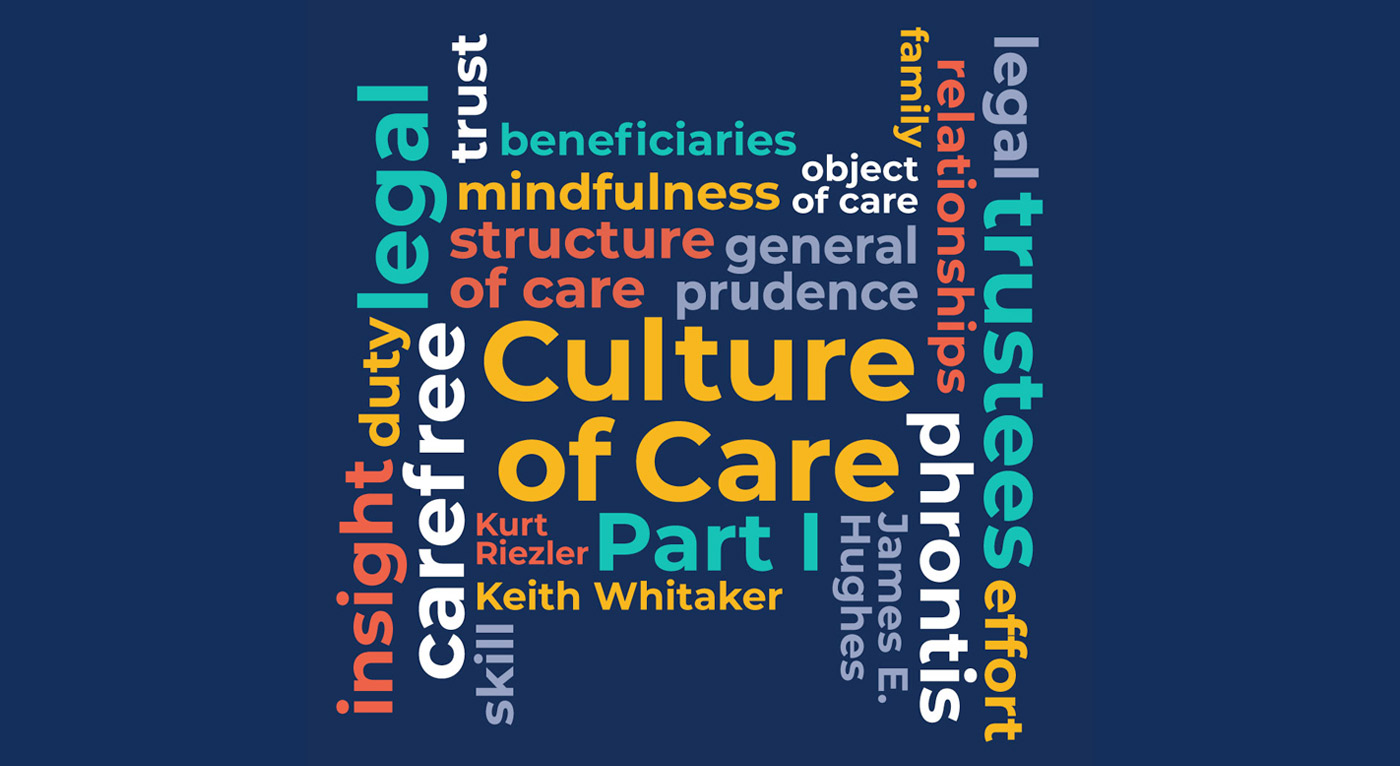
View this edition in our enhanced digital edition format with supporting visual insight and information.
Thank you to FFI Fellow James E. Hughes, Jr., and Keith Whitaker for this two-part article series, commissioned by the James E. Hughes, Jr. Foundation. In these articles, the authors reflect upon the meaning of “care” and how it is exhibited and can be developed through trusts, using their own experiences and the work of philosopher Kurt Riezler.
Please read on for Part I.
On a number of recent occasions we have spoken or written about the importance of building “a culture of care” in trusts. What do we mean by this culture of care?
First, let’s eliminate some potential misconceptions.
For most of us, any reference to “care”—especially a “culture of care”—likely evokes the image of a therapeutic environment: perhaps a hospital or a doctor’s office, the realm of “healthcare.” This is not what we mean by care. We do not expect trustees to become doctors or psychologists. For us, a culture of care is not primarily therapeutic.
Trusts are legal relationships. But herein lies another possible misconception. Trustees are subject to a host of duties, which have been given shape by case law and statute, and fulfilling these duties involves care. For example, the trustee’s fundamental duty to be “generally prudent” means to act in all aspects of administration of the trust with “reasonable care, skill, and caution.” This duty requires acting personally and, when delegating functions, exercising reasonable care in the selection of agents. Care also finds its way into other fundamental duties: the duty to act requires care in ascertaining the intent of the settlor and the terms of the trust. The duty to be loyal requires not only care in avoiding self-dealing but also, and more importantly, in identifying and furthering “the benefit of the beneficiaries.” The duty to account demands that care be exercised in keeping the trusts’ records and in accounting to the proper beneficiaries at the proper times and in the appropriate ways. Care is a standard of conduct for trustees, as it is for airline pilots or surgeons. But there is no “duty to care” or “duty of care.” “Care” in this legal sense does not get to the heart of what we mean by building a culture of care.1
For us, a “culture of care” connects to what we see as the fundamental purpose of trusts: to enhance the lives of the beneficiaries. But this purpose raises more questions: What does “life enhancement” look like? What is the proper role of trustees in “life enhancement”? What preparation do trustees need to do this well? Our suggestion is that thinking seriously about what a culture of care looks like may help us begin to address these and other questions.
How, then, can we get to a deeper understanding of care? At the risk of trying to explain the obscure through the more obscure, we would like to suggest that we spend some time considering the thought of Kurt Riezler on the subject of care.
Born in 1882 into a prominent German family and educated at the premier institutions of his time, Riezler held high positions in the Imperial Chancellery prior to and during the First World War. After the war, he served as a university rector and philosophy professor. He left Germany in 1938 and accepted a professorship at the New School, where he remained until shortly before his death in 1955. Riezler is known for his writings on shame, play, and other topics in political philosophy. He collected his thoughts on this front in his book Man: Mutable and Immutable: The Fundamental Structure of Social Life.2
Riezler’s book includes a chapter on care. His approach is phenomenological. That is, he does not ask why people care, trying to uncover hidden psychological motives. Rather, he asks repeatedly what care is. He seeks to describe what shape it takes in human beings’ social life.
Riezler begins to examine care through the medium of classical poetry (Homer). He finds in it three element: 1) phrontis, 2) epimeleia, and 3) merimna.3
Phrontis is care in the sense of thoughtfulness or mindfulness. It is the intellectual side of care. When it comes to trusts, this part of care is evident. Trustees must pay attention and keep track of things. They must not be reactive or arbitrary; they must think through a process of careful administration. They must educate themselves in the relevant subjects, or wisely choose good counsel. They must try their best to think ahead. All these activities belong to care as phrontis.
Epimeleia means care in the sense of practice or applied effort. Again, it’s not a surprise that being a trustee requires diligence. The trustee cannot guarantee positive results, but he or she must be able to show that care as thought has transformed itself into care as thoughtful action.
Merimna means grief or worry. Put simply, care worries. Trustees are often worriers. They must think about worrisome things: death, divorce, drugs, for example. Of course, “generative” trustees don’t only focus on the dangers. They also try to help people live better. But even in this “positive” work, there is care in the form of worry. Perhaps the most basic worry is, “Did I do no harm?”
Riezler turns quickly from these three elements of care to a deeper exploration of the basic structure of care.
He writes, “Care is care for something. … Care is never alone, nothing but care.”4 The point is simple, but it helps us flesh out a “culture of care.” Such a culture does not amount to emoting. One cares specifically for this trust, this set of relationships, these beneficiaries.
This insight has practical consequences. For example, a culture of care requires that a trustee be able to answer, at any given time, the question, “How are the beneficiaries under your care doing?” That answer requires knowing how many beneficiaries you have in care, who they are, how they’re doing now in the light of who they are, what they’re capable of, and what “well” or “poorly” would mean with respect to these specific people.
This point—that care is care for something—also helps explain why it doesn’t sound right to speak about a “duty of care” or to attempt to list care among the duties of a trustee. Duty is for its own sake. For example, a trustee has a duty to exercise general prudence regardless of the outcomes or who is affected. Care is for someone or something. Duty can be exercised with care. But exercising care means more than doing your duty.
Examples abound of trustees going “above and beyond.” One colleague shared with us the story of a trustee educating herself about a beneficiary’s mental health challenges, which allowed the trustee to recognize when the beneficiary was at risk of a relapse. It’s not likely a court would require a trustee to be so proactive. But such thoughtfulness is a fitting part of a culture of care.
Riezler extends this point about the object of care: “All care cares for something alive. Whenever we care for something dead, our care endows it with some kind of life.”5 This simple insight helps explain what we mean by a culture of care in trusts. Family members feel dissatisfied with trusts when they believe that the trust is nothing but a dead entanglement borne out of mistrust. To solve this problem, we have encouraged interested parties to “deconstruct” these legal relationships. We have encouraged trust creators to express “the spirit of the gift” in letters of wishes. We have encouraged trustees and beneficiaries to build human relationships with each other through regular assessments and meetings. These efforts reflect that “care” cares for something living, something that, by virtue of being alive, faces the risk of being damaged or dying.
Next, Riezler unfolds this basic structure of care: “Care, dwelling with the thing, weaves a mutual relation between man and thing.”6 Again, this is a simple point, with profound consequences. The trustee who cares sees these beneficiaries as “my” beneficiaries. Further, as trustee, I belong to this trust and its associated parties. I am theirs, and they are mine.
Care in this sense is a basis for property. Riezler gives the example of a gardener’s flowers: his care for them makes them his even more than some “right” does. This point has implications for trusts. Our laws tend to equate ownership with the exclusive right to use and enjoy something. Ownership means enjoyment, which most owners equate to freedom from care. This perspective turns ownership into consumption, which has its place; but we know that viewing the world this way also causes many beneficiaries (and wealthy people generally) to feel spiritually empty. They crave deeper “engagement” with others and with their property. A culture of care is a place of belonging.
Care is a way of being in this world, a way of giving yourself to the world, or to someone in the world, and thereby gaining yourself, “being” in the fullest or almost fullest sense. This is the basic structure of care.
In the next installment in this two-part piece, the authors consider what Riezler has to say about the “matters of care” and its application to the world of trusts.
References
1 Charles E. Rounds, Jr., and Charles E. Rounds, III, Loring and Rounds 2015: A Trustee’s Handbook (Wolters Kluwer, 2015), section 6.1.5, “The Duty to Account to the Beneficiary,” 531–557. Restatement of the Law Third, Trusts (American Law Institute).
2 Riezler, Kurt. Man Mutable and Immutable: The Fundamental Structure of Social Life. Henry Regnery Company, 1950.
3 Riezler, Man Mutable and Immutable, 137.
4 Riezler, Man Mutable and Immutable, 138–139.
5 Riezler, Man Mutable and Immutable, 139.
6 Riezler, Man Mutable and Immutable, 139.
About the Contributors
 James E. Hughes, FFI Fellow, is the author of Family Wealth: Keeping It in the Family, and of Family: The Compact Among Generations, as well as co-author of many books in the field of family wealth. Jay was the founder of a law partnership specializing in the representation of private clients. In 2021, The James E. Hughes, Jr. Foundation (www.jehjf.org) was founded in Jay’s honor. He can be reached at contact@JEHJF.org.
James E. Hughes, FFI Fellow, is the author of Family Wealth: Keeping It in the Family, and of Family: The Compact Among Generations, as well as co-author of many books in the field of family wealth. Jay was the founder of a law partnership specializing in the representation of private clients. In 2021, The James E. Hughes, Jr. Foundation (www.jehjf.org) was founded in Jay’s honor. He can be reached at contact@JEHJF.org.

Keith Whitaker, PhD, is the founding director of Wise Counsel Research Foundation. An educator who consults with leaders and rising generation members of families with significant wealth, he also serves select families as an independent trustee. He can be reached at keith@wisecounselresearch.com.

View this edition in our enhanced digital edition format with supporting visual insight and information.





